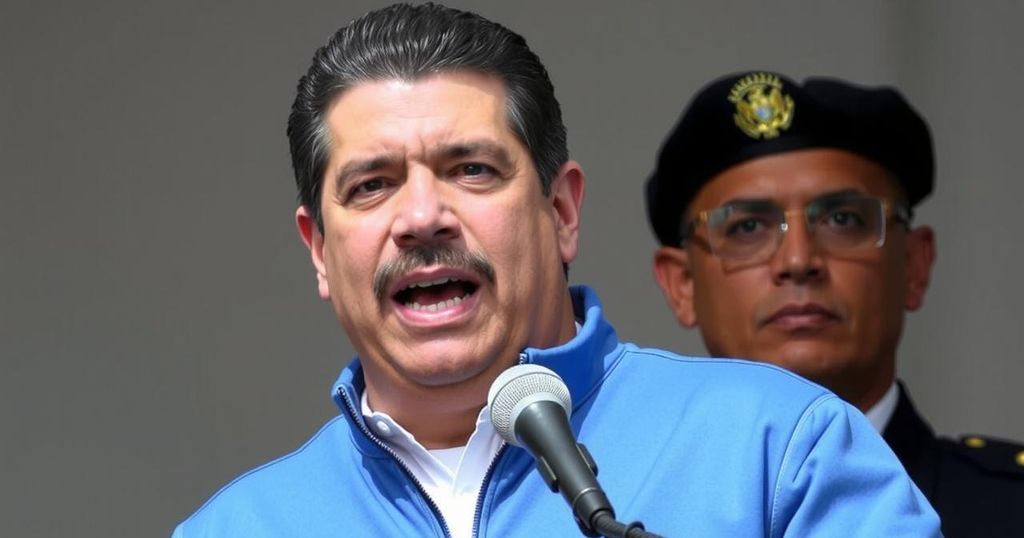Nicolas Maduro has been sworn in for a third term as Venezuela’s president following a disputed election, which his opponent Edmundo Gonzalez claims was marred by vote fraud. Despite international criticism and sanctions, Maduro proclaimed his commitment to peace and prosperity. Ongoing opposition protests reflect the deep political divisions and societal unrest within the country, underscored by substantial repression and calls for democratic reform.
On Friday, Venezuelan President Nicolas Maduro was sworn in for a third six-year term, following a controversial election. His opponent, Edmundo Gonzalez, has claimed voter fraud and declared victory over legitimacy concerns surrounding Maduro’s rule. Despite facing international sanctions and the United States recognizing Gonzalez as the rightful winner of July’s vote, Maduro asserted that this new term would usher in a period marked by peace, prosperity, and equality. Opposition protests against his inauguration reflect the ongoing turmoil within the country, characterized by substantial political repression and economic hardship.
Maduro’s rise to power began after the death of his predecessor, Hugo Chavez, in 2013. His leadership has been continually challenged by allegations of authoritarianism amid significant economic turmoil and societal unrest. Following a rigged election in 2018, opposition leader Juan Guaido declared himself president, leading to a significant international response that included recognition from the U.S. and others. In contrast, Maduro has maintained control, citing electoral authority support, despite opposition claims of widespread vote manipulation.
In the wake of the contested elections in July, which saw Maduro claiming 51 percent of the vote, opposition leaders argue that the electoral process lacked transparency. The country’s electoral authorities did not provide conventional voting results, deepening the skepticism around Maduro’s claims. This period of electoral and social unrest has compelled many Venezuelans to flee, with nearly 7.7 million leaving due to political and economic instability.
Amid the rising discord, opposition demonstrations have been met with governmental repression. Demonstrators protesting Maduro’s policies have faced detentions and violence, with reports indicating that about 2,000 arrests occurred after the elections, resulting in 25 fatalities. Notably, opposition figure Maria Corina Machado continued to rally support against Maduro, emphasizing her resolve despite facing personal risks, including brief detention during protests.
In the international arena, the U.S. government continues to support Gonzalez, labeling him the “president-elect” while condemning Maduro’s repressive tactics. Following the election results, protests ensued; however, government crackdowns have diminished the demonstrations’ intensity. In an effort to maintain pressure on Maduro, opposition movements are calling for renewed protests while navigating an environment characterized by fear of political repression and economic collapse. The political landscape in Venezuela remains tumultuous, with Maduro’s recent inauguration presenting a pivotal moment in the country’s ongoing struggle for democracy and stability.
The political situation in Venezuela has been fraught with conflict and controversy, particularly following the death of leftist leader Hugo Chavez in 2013, when Nicolas Maduro ascended to power. His presidency has been marred by allegations of authoritarianism and significant economic challenges. The recent elections have intensified these issues, with claims of voter fraud and lack of transparency fueling discontent among opposition leaders and the international community. U.S. involvement and sanctions against Maduro’s regime highlight the geopolitical implications of Venezuela’s internal struggles, complicated further by mass emigration and human rights concerns.
The inauguration of Nicolas Maduro for a third term amid allegations of electoral fraud signals the continuation of a deeply polarized and contentious political environment in Venezuela. While Maduro pledges a new era of peace and equality, the opposition remains firm in its rejection of his presidency, leveraging international support to challenge his authority. The pervasive atmosphere of unrest and repression suggests that the struggle for true democratic governance in Venezuela is far from over, with significant consequences for the nation’s future.
Original Source: www.aljazeera.com






